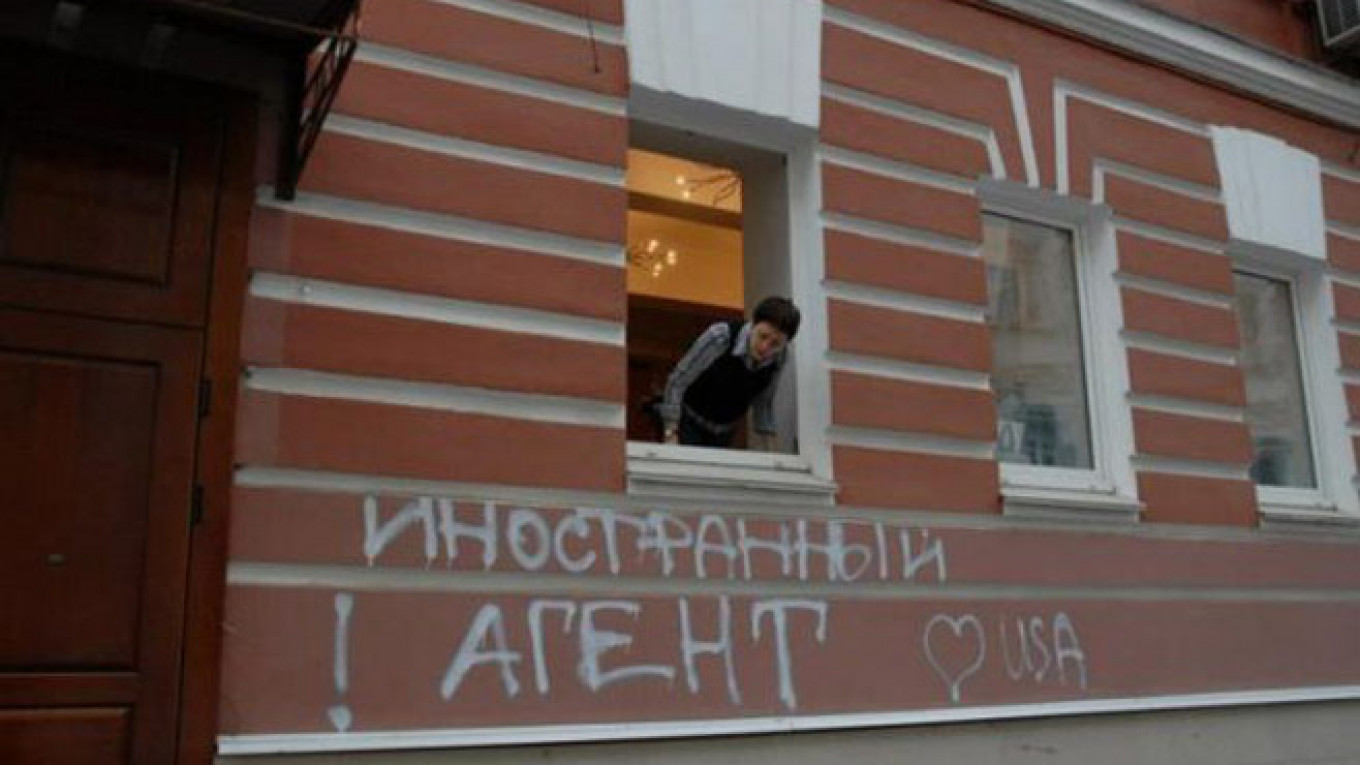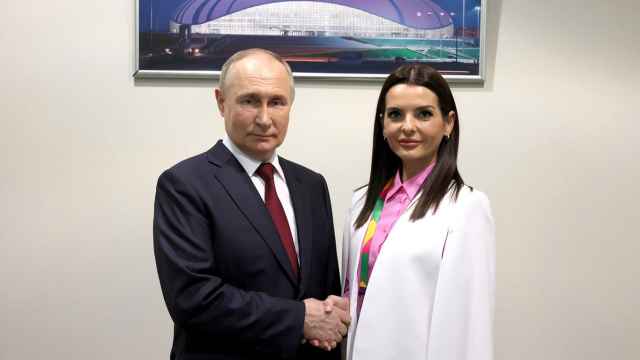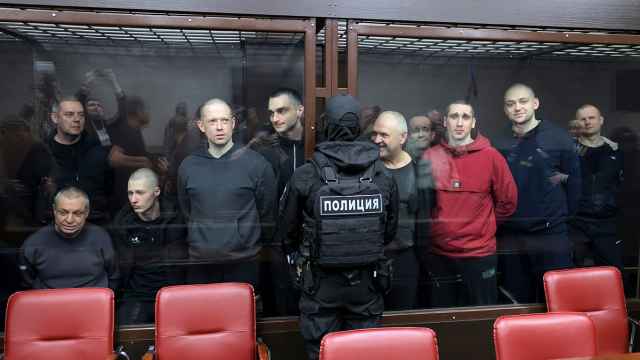In what experts see as Moscow's latest bid to rein in civil society, Russian senators released a list Wednesday of 12 foreign NGOs whose work they believe poses a threat to national security, and who should thus be declared "undesirable" and prohibited from operating in the country.
The Federation Council — Russia's upper house of parliament — compiled a so-called "patriotic stop-list," consisting of seven American organizations, two Ukrainian diaspora groups, two Polish NGOs and an obscure rights group based in the annexed Crimean Peninsula.
The Federation Council's Patriotic Stop-List:
Open Society Foundation
National Endowment for Democracy
National Democratic Institute for International Affairs
International Republican Institute
MacArthur Foundation
Freedom House
Charles Stewart Mott Foundation
Education for Democracy Foundation (Poland)
East European Democratic Center (Poland)
Ukrainian World Congress
Ukrainian World Coordinating Council
Crimean Human Rights Field Mission
In accordance with controversial legislation signed into law by President Vladimir Putin in May, the senators' recommendations will next be forwarded to Prosecutor General Yury Chaika, Foreign Minister Sergei Lavrov and Justice Minister Alexander Konovalov. They will determine whether the listed NGOs pose a "threat to the foundations of the constitutional system of the Russian Federation, its defense capabilities and its national security."
If the stop-list gets their stamp of approval, the 12 organizations will be formally declared "undesirable." At that stage, their work will be prohibited on Russian territory. First-time offenders found guilty of "participating" in their activities will face fines of 15,000 rubles ($261). Recidivists will face up to six years behind bars.
The stop-list is staggeringly diverse. It included several well-known politically-oriented NGOs, such as the National Endowment for Democracy (NED), the International Republican Institute (IRI) and Freedom House. But it also featured Crimean Human Rights Field Mission — which has neither an office to work in nor an annual budget to spend, its head told The Moscow Times.
In a resolution accompanying the list, senators claimed that the organizations share a common aim: to subvert the internal political situation in Russia, carrying out through their work a policy of "soft aggression" against the country and its people, Interfax reported.
In comments to The Moscow Times, a spokesperson for Freedom House — an organization rooted in democracy and civil liberties — said the introduction of the "undesirable organizations" policy attests to the weakness of the Russian state.
"The Russian government is working relentlessly to crush political rights and civil liberties," said the spokesman, who preferred not to be named due to internal Freedom House policy.
"We believe that the government should not fear citizens' rights and liberties. Strong, confident governments support basic freedoms. Vulnerable, insecure regimes fear their own citizens and their rights," he said.
Freedom House — whose first co-chair was Eleanor Roosevelt, wife of U.S. wartime President Franklin D. Roosevelt — describes itself as a "catalyst for freedom through a combination of analysis, advocacy and action."
In its 2015 "Freedom in the World" survey, which ranks countries based on political rights and civil liberties, Russia was listed as "Not Free," a category one step up from "Worst of the Worst."
Putin has repeatedly sounded the alarm over his fear that Western states use NGOs as pawns in their game of manipulating public opinion in strategically important countries across the globe. According to this logic, pro-democracy NGOs stir up popular discontent — sometimes even fomenting revolutions — in a thinly veiled bid to advance murkier foreign policy interests.
In the interest of preventing such a scenario on its own soil, the Kremlin had initiated a series of measures to bolster its control of Russian civil society. Before passing the "undesirable organizations" law, federal lawmakers adopted a 2012 law relegating NGOs that receive funding from abroad and are engaged in vaguely defined "political activity" to a list of "foreign agents" — a label widely associated with espionage in Russia.
Critics have blasted these measures, claiming that rather than protecting national interests, they aim to keeping the ruling elite secure in their positions of power.
"The government's logic is that any human rights work is harmful to the country," said Andrei Zubarev, head of the Crimean Human Rights Field Mission (CHRFM), a joint Russian-Ukrainian organization that has monitored human rights violations in the peninsula since shortly before its 2014 annexation.
After landing on the senators' stop-list, Zubarev said the beleaguered NGO plans to cease operations. "What will happen is that our organization, which consists of five people who receive no funding from anyone, will stop working in Crimea [before it can be officially] declared undesirable," Zubarev said in a phone interview.
Justyna Janiszewska, president of the board of Polish NGO the East European Democratic Center, has linked her organization's appearance on the stop-list with its work in Ukraine.
"We believe that this decision was made because we are very active in Ukraine and because we have supported Euromaidan," Janiszewska said in a phone interview, referencing the large-scale protest movement in Kiev that led to former Kremlin-friendly Ukrainian President Viktor Yanukovych's February 2014 ouster.
"There seems to be some kind of a close relationship between activity in Ukraine and being on this list," she said. Notably, all of the organizations on the stop-list have carried out advocacy work in Ukraine.
Leonid Gozman, a prominent human rights advocate who completed a fellowship with NED between October 2014 and February 2015, said in comments to The Moscow Times: "I have no grounds to believe that NED is an anti-Russian organization."
Gozman, who presently serves as president of the Perspektiva foundation, a Russian organization that lobbies for the rights of people with disabilities, referred to the list as "unprofessional" and wondered how the authorities plan to prohibit the operations of organizations that lack a formal presence in Moscow.
Both NED and IRI closed their offices in Russia in 2012, citing "harsh conditions." Among the listed organizations, only the MacArthur Foundation and the Ukrainian World Congress still have offices in Russia.
According to the MacArthur Foundation's website, the organization's Russian branch "primarily seeks to support effective protection of the rights of Russian citizens and to foster Russia's involvement into multilateral efforts to address global challenges."
The Ukrainian World Congress advocates for the interests of members of the Ukrainian diaspora in Russia.
Attempts to solicit comments from both organizations were unsuccessful by the time of publication.
"I think it is very sad that our government believes in these primitive schemes, according to which the United States can stir up a revolution in another country via NGOs," Gozman said.
Contact the author at i.nechepurenko@imedia.ru
A Message from The Moscow Times:
Dear readers,
We are facing unprecedented challenges. Russia's Prosecutor General's Office has designated The Moscow Times as an "undesirable" organization, criminalizing our work and putting our staff at risk of prosecution. This follows our earlier unjust labeling as a "foreign agent."
These actions are direct attempts to silence independent journalism in Russia. The authorities claim our work "discredits the decisions of the Russian leadership." We see things differently: we strive to provide accurate, unbiased reporting on Russia.
We, the journalists of The Moscow Times, refuse to be silenced. But to continue our work, we need your help.
Your support, no matter how small, makes a world of difference. If you can, please support us monthly starting from just $2. It's quick to set up, and every contribution makes a significant impact.
By supporting The Moscow Times, you're defending open, independent journalism in the face of repression. Thank you for standing with us.
Remind me later.






